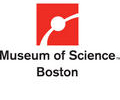Forum Network
Free online lectures: Explore a world of ideas

One of the world's largest science centers, the Museum of Science, Boston attracts 1.6 million visitors a year through vibrant programs and over 550 interactive exhibits. Its mission is to stimulate interest in and further understanding of science and technology and their importance for individuals and society. Other features include the Thomson Theater of Electricity; Current Science & Technology Center; Charles Hayden Planetarium; Gilliland Observatory; and Mugar Omni Theater. The Museum's exhibit plan, Science Is an Activity, has been awarded several National Science Foundation grants and profoundly influenced exhibit development at other major science centers.